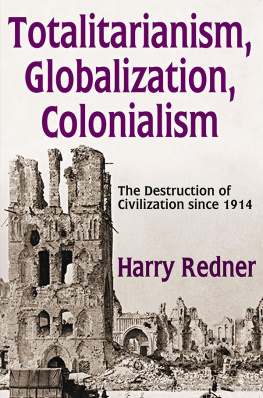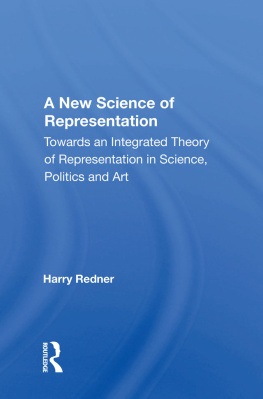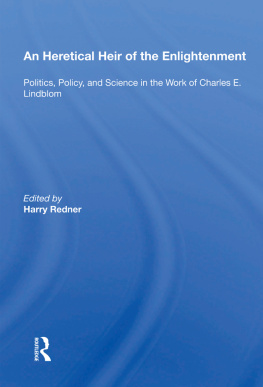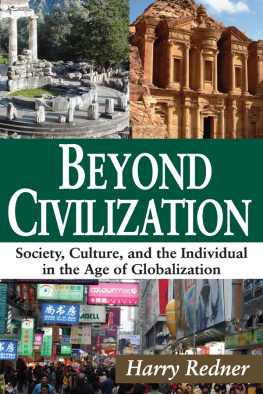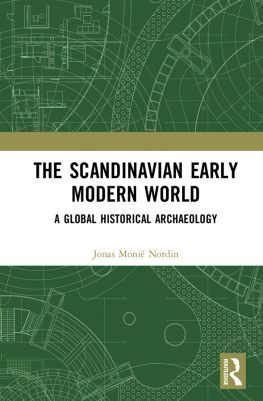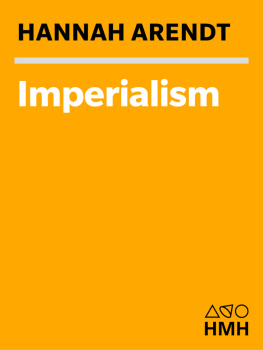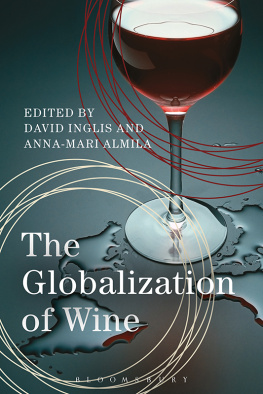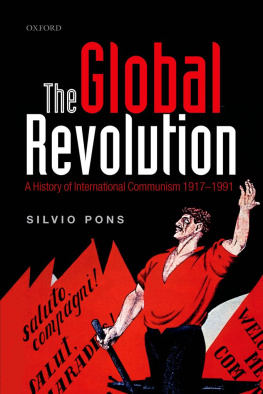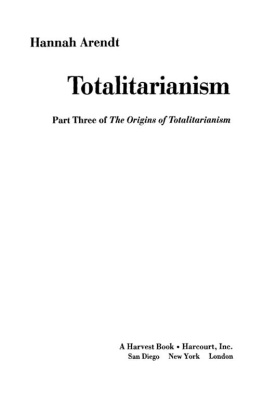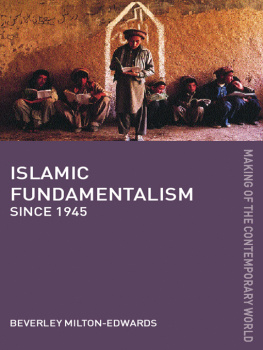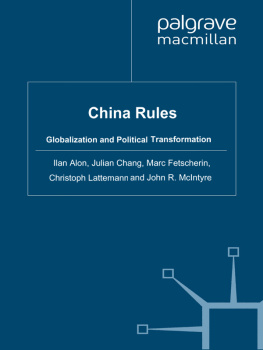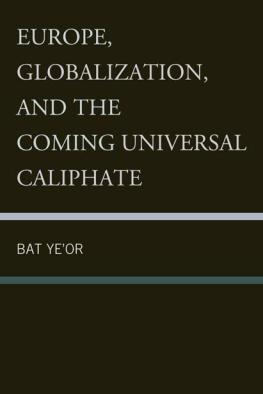First published 2014 by Transaction Publishers
Published 2017 by Routledge
2 Park Square, Milton Park, Abingdon, Oxon OX14 4RN
711 Third Avenue, New York, NY 10017, USA
Routledge is an imprint of the Taylor & Francis Group, an informa business
Copyright 2014 by Taylor & Francis.
All rights reserved. No part of this book may be reprinted or reproduced or utilised in any form or by any electronic, mechanical, or other means, now known or hereafter invented, including photocopying and recording, or in any information storage or retrieval system, without permission in writing from the publisher.
Notice:
Product or corporate names may be trademarks or registered trademarks, and are used only for identification and explanation without intent to infringe.
Library of Congress Catalog Number: 2013039627
Library of Congress Cataloging-in-Publication Data
Redner, Harry.
Totalitarianism, globalization, colonialism : the destruction of civilization since 1914 / Harry Redner.
pages cm
Includes bibliographical references.
ISBN 978-1-4128-5397-2 (cloth : alk. paper) 1. Civilization,
Modern--20th century. 2. Totalitarianism--History--20th century. 3.World politics--20th century. 4. East and West. 5. Globalization. I. Title.
CB425.R337 2014
320.53--dc23
2013039627
ISBN 13: 978-1-4128-6301-8 (pbk)
ISBN 13: 978-1-4128-5397-2 (hbk)
Contents
Introduction
A century after the start of the First World War, we can reflect on the changes to civilization in the period from 1914 to 2014, which we will call the twentieth century for purposes of historical analysis. The Great War released a flood of events that engulfed Europe first, then the rest of the world, and gave rise to one of the most traumatic centuries in human history. At times in this period, humanity itself came close to the abyss, in ways never possible before the advent of weapons of mass destruction. In sheer numerical terms it was the most bloody century in history; and even if the loss of life is measured in proportion to the total human population, it still ranks close to the top, perhaps exceeded only by the Mongol depredations in the thirteenth century. For sheer slaughter, the first half of the century, 1914 to 1964, has rarely, if ever, been surpassed. It is true that in the next half-century calm was to a considerable extent restored, with only the occasional mass murder, usually in an out-of-the-way place. Perhaps mankind realized how close it had come to perdition just as the halfcentury was closing and recoiled from further killing. For the present, the danger of nuclear holocaust has receded, though it has not been completely removed.
However, our main interest is not in recounting the horrors of our time; rather, it is in examining their effects on civilization, a subject that is seldom addressed. These might have been much worse than in fact they were. A different outcome to the Second World War, an even greater catastrophe than the First, might have spelled a grave setback for civilization. If Hitler had won the war in the East, as he came within an ace of doing, Europe would have been under Nazi totalitarian domination for far longer than it actually was. Since America was likely to have developed nuclear weapons first, it would probably have used them to devastate Germany, with horrendous consequences for European civilization in general. A similar outcome can be envisaged if, due to some quirk in weather or other mischance, D-day had failed and the Allies had been unable to land in Europe in time to prevent Stalin from overrunning the whole of Germany and most of Western Europe as well. This, too, would probably have led to nuclear war and the utter ruination of Europe and other parts of the world.
All in all, it was "a damn close run thing"to paraphrase the Duke of Wellingtonthat civilization survived beyond the twentieth century. And the danger has not passed. Disasters can still ensue from many quarters, whether through wars or environmental catastrophes or incurable diseases, or other still unsuspected calamities. However, these are not the issue with which we are concerned in this book. Our interest is not with what might have happened or what could potentially happen, but merely with what actually happened. Our aim is not to pursue some "end-of-civilization" thesis, the kind usually proffered in vatic tones fit for parody, in which whatever the writer happens to fear or loathe is set down as boding "the end of civilization as we know it." No such end-of-civilization thesis is entertained here.
The destruction of civilization with which we are concerned is an extended and enduring historical process with no foreseeable end. It is a slow withering away that could go on, cease, or reverse itselfwe have no way of predicting in the long run which it will be. Best described as a de-civilizing process, it developed with frightening rapidity in the twentieth century and seems set to continue well into the twenty-first, for no countermovement is as yet discernible. We might hope for such a reversal, and we are duty bound to work for it, but we have no grounds for assuming it will necessarily occur. Civilization is now in the balance for the very first time in human history. How this balance tips will depend on the aspirations and unpredictable actions of future generations. All we can do is seek to influence them by safeguarding what is left of the civilization we inherited from our predecessors. Communication between the generations, as we pass on old and recent traditions, is clearly our key responsibility.
Among the relatively more recent traditions that are crucial for the future survival of civilization are those of the Enlightenment, as the outstanding historian Eric Hobsbawm declared: "I believe that one of the few things that stands between us and an accelerated descent into darkness is the set of values inherited from the eighteenth-century Enlightenment." In a brief lecture delivered late in his life, Hobsbawm spells out what he means by "darkness," which he also calls "barbarism," utilizing the traditional terminology deriving from the fall of the classical civilization that, as we will show, is not altogether appropriate:
The argument of this lecture is that, after about 150 years of secular decline, barbarism has been on the increase for most of the twentieth century. In this respect I understand "barbarism" to mean two things. First, the disruption and breakdown of the system of rules and moral behavior by which all societies regulate the relations among their members and, to a lesser extent, between their members and those of other societies. Second, I mean, more specifically, the reverse of what we may call the project of the eighteenth-century Enlightenment, namely, the establishment of a universal system of such rules and standards of moral behavior, embodied in the institution of states dedicated to the rational progress of humanity.
In defining "barbarism," Hobsbawm has in effect also offered a cursory definition of its opposite, namely, civilization. In this view, which we share, civilization in modern times is primarily a matter of "the system of rules and moral behavior" and of "the rational progress of humanity"; or, putting it in a nutshell, of ethics and rationality, which, as we will show, are closely bound up with standards of higher literacy. It is, therefore, mainly in respect of ethics, rationality, and higher literacy that we need to assess the extent of the destruction of civilization in the twentieth century.

